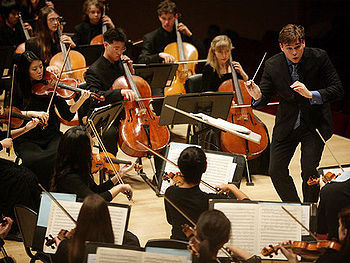Remember, not so long ago, when it was possible to hear classical music on the radio in New Orleans during the day?
If you had access to an FM radio, you could tune in to WWNO (whose license is owned by the University of New Orleans) and hear a diverse blend of classical music any time of the day or night.
 WWNO changed its format to talk and informational programming a couple of years ago. The station still offers classical and jazz on its high-def digital stations, but one needs special radio equipment to access that, so your average joe, who perhaps can’t afford the equipment, won’t have access to classical music or opera during the day.
WWNO changed its format to talk and informational programming a couple of years ago. The station still offers classical and jazz on its high-def digital stations, but one needs special radio equipment to access that, so your average joe, who perhaps can’t afford the equipment, won’t have access to classical music or opera during the day.
Now, I understand this switch as a business decision. There’s apparently more listenership available for news-oriented and talk shows during daytime hours on the easily accessible WWNO 89.9 position. Higher listenership means that you can sell more and more expensive sponsorships (that literally means advertising, although public broadcasters are limited by verbiage in any of the sponsorship announcements). So apparently it’s what the listeners want; they listen to the station more than they did when it was purely classical music.
WWNO calls itself “your source for NPR news, music and culture,” but its daytime programming is pretty much exclusively news, information, talk and local content, not classical music.
Aren’t we sort of missing something here?
We know that New Orleans is a relatively poor city, but almost everyone has access to an FM radio. Isn’t there something missing in a major American city like New Orleans—a music city that was actually the site of the first American opera house—when there’s no easily-accessible classical music being broadcast to the city?
Many who love classical music, musicians, and everyday folk alike, learned to appreciate and ultimately perpetuate the music by first hearing it on the radio. How else is one supposed to be exposed to such a cultural treasure on an everyday basis? Anyone who reads OffBeat is probably well-aware that an exposure to classical music is an activity that not only stimulates the brain, but also creates a continuing market for music of this type.
Will future generations of New Orleans kids become totally ignorant of the richness of our classical musical heritage? If they don’t have exposure to it, they might very well.
If WWNO and UNO can’t provide classical music resources as they once did, can some other radio station step into its shoes? Can the cultural institutions like the Louisiana Philharmonic Orchestra and the New Orleans Opera Association (among others) step up to the plate to provide this vital service? It’s in their best interests to do so: exposing a younger audience to the music is also a guarantee that there will be an ongoing appreciative audience in the future as well.




